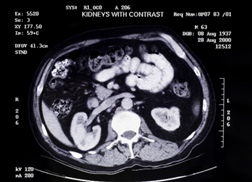
The condition in question is called nephrogenic systemic fibrosis (NSF), which is characterized by the progressive hardening of the skin around the joints and eventually the organs. This hardening is due to the formation of excess fibrous connective tissue. Patients have difficulty moving and usually wind up in a wheelchair. In some cases, skin becomes so hard that the patient cannot transition from a lying position to standing without help.
Complicating matters is the fact that some patients may have nephrogenic systemic fibrosis without realizing it. Nephrogenic systemic fibrosis can be misdiagnosed as either scleroderma or sclerodeema due to a lack of knowledge about NSF and gadolinium-based contrast agents. Furthermore, it can take a year and a half or more for NSF to develop, making it less likely that doctors or patients would make the connection between the MRI and the condition.
Patients can request a punch biopsy from a dermatologist to determine if they have NSF.
READ MORE MRI HEALTH RISK LEGAL NEWS
The FDA mentioned those particular contrast agents, noting they are associated with a greater risk of nephrogenic systemic fibrosis than other gadolinium-containing contrast agents. So far, NSF has only been reported in patients with kidney problems. People with kidneys that function normally have not reported developing the condition.
"Patients at greatest risk for developing NSF after receiving GBCAs are those with impaired elimination of the drug, including patients with acute kidney injury or chronic, severe kidney disease," the FDA's news release states.
In making its announcement, the FDA said patients should be screened before being given a gadolinium-based contrast agent to ensure they do not have acute kidney injury or kidney disease.
